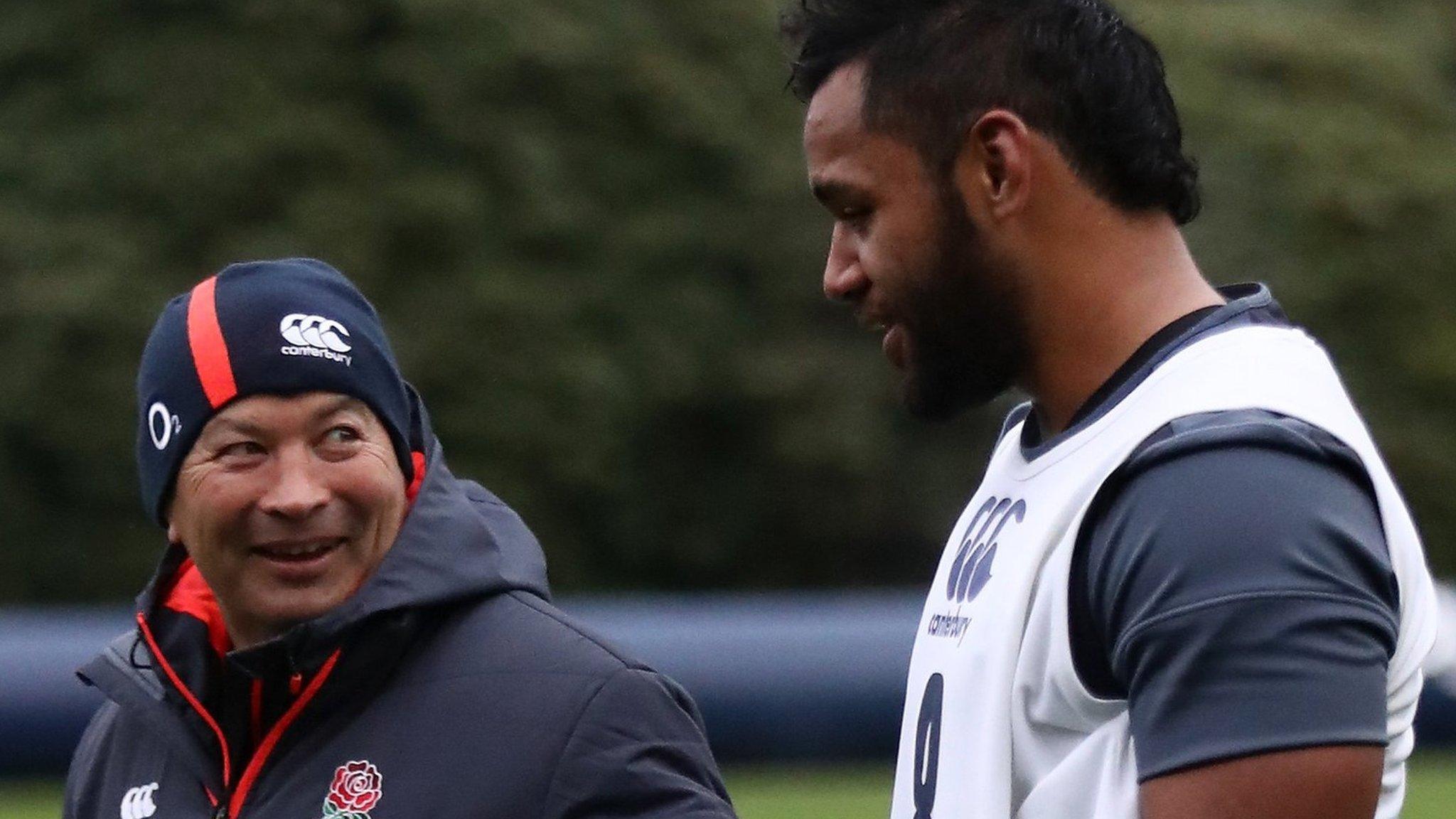How not to win a Lions series: Discord & disarray, 12 years on
- Published
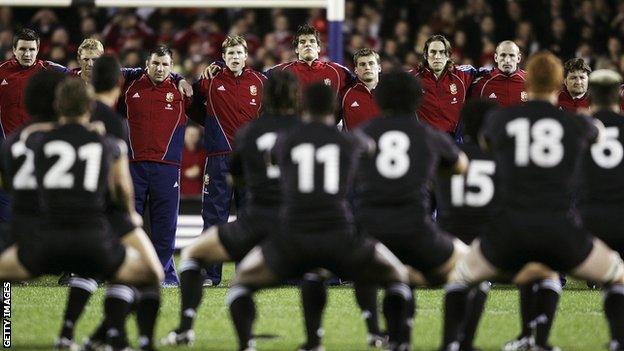
The 3-0 series defeat by New Zealand was the first time in 22 years that the Lions lost every Test match on tour
British and Irish Lions 2017 |
|---|
Date: 3 June - 8 July Venue: New Zealand |
Coverage: Live text commentary on every match on the BBC Sport website and mobile app. |
Selection rows and tactical confusion. Discord and disarray in the ranks. Horrific injuries and endless rows about them. Strange songs, lost and lonely players, a head coach sinking under a toxic mix of expectation, miscalculation and hubris.
Twelve years on from that disastrous British and Irish Lions tour to New Zealand, the whole thing still has a nightmarish quality about it, leavened now by a gallows humour.
All that could go wrong did go wrong. Much that most thought could not, did too.
As the Lions return to face the All Blacks for the first time since that brutal evisceration, the major figures in the 2005 tour have been reflecting on their unhappy experiences for a BBC Radio 5 live special. This is 'how not to win a Lions series'. And it is not a pretty tale.
The selection
England had finished the 2005 Six Nations in fourth place. They had ended the 2004 campaign mid-table. So when coach Sir Clive Woodward announced that 20 of his 44-man squad were from his home country - and that three more Englishmen would join the party, once fit - the arguments began to rage.
Never before had so many players been taken. Seldom had a Grand Slam-winning team provided such a small proportion as Six Nations champions Wales, external did that year.
But Woodward had a plan. And even a decade on, he is unapologetic.
"We had just won a World Cup, and we've got an amazing England team," he says.
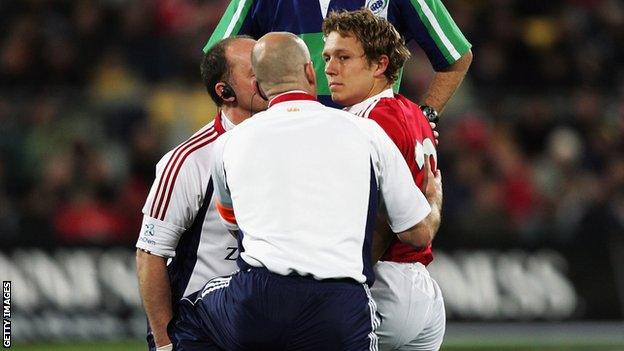
Jonny Wilkinson was a key part of the England team that won the 2003 World Cup
"I was looking at the other countries, especially at the likes of Brian O'Driscoll and Paul O'Connell [both Ireland] and thinking, if we can put a few of these guys into the England team, then we can beat New Zealand.
"It's not about numbers or being bloated. It's about getting your Test team prepared for the first Test match.
"You need your top-five superstar players on top of their game. O'Driscoll, O'Connell, Jonny Wilkinson, Richard Hill, Neil Back, Lawrence Dallaglio. And it just didn't materialise."
Injury would take care of some of those. Others never got the chance. Gavin Henson had just kicked Wales to a first Grand Slam in 27 years, but he would not be part of Woodward's first-choice XV.
"The selection was something we never got to grips with," says Eddie O'Sullivan, then-Ireland head coach, one of Woodward's assistants on the tour.
"There were a lot of people in selection meetings - all the coaches, referee's advisor. There were 11 people in the room. It was very unwieldy.
"That was one small part of it. The bigger part of it, in retrospect, was whether we should have built the Test side. We kept changing every day. Clive in his head kept moving things around, and would then throw this team at the All Blacks.
"His curve-ball, which he didn't tell us about until the last minute, was playing Wilkinson at inside-centre and Stephen Jones at 10. That was fine, but we never actually practised with that combination. We went into the Tests with a combination that wasn't really tested, and I think that was a strategic flaw."
The tactics
Woodward's England had won the World Cup in Australia, external two years before by controlling matches through a dominant set of forwards, kicking their penalties and then cutting loose through tired defences late on.
In New Zealand, no-one was ever quite sure of the plan. And that included the coaches.
"I always found Clive engaging, and a man who thinks outside the box," says O'Sullivan.
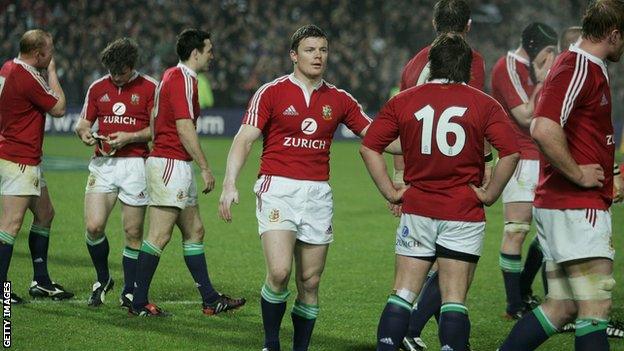
The team were originally captained by Ireland's Brian O'Driscoll, but he was replaced by Wales' Gareth Thomas after injury
"But it was hard to engage with Clive because we had so much going on - so many players, so many staff. I just felt from the off that we never got our arms round the thing. I think Clive was struggling with that.
"We never sat down and actually nailed down a strategy to beat the All Blacks. No-one said, 'This is what we have to do'.
"And to me that was surprising. We almost played the All Blacks without a clear strategy of what was required to defeat them. We never got to that clarity of vision, and that became evident in the Test series.
"Clive was working at Formula 1 pace around everything. Getting time to drill down on the stuff that as a coach you want to drill down on proved very difficult."
The opening Test in Christchurch was the first time that particular XV had played together. Woodward made 11 changes to his match-day squad for the second. Two of his three starters in the back row for the final three tests had not even been part of that original 44-man party.
The spin doctor
It wasn't only the playing party that was bigger than ever before. Woodward took 28 support staff with him. Among them, as head of communications, was Alastair Campbell - the controversial former press secretary to Prime Minister Tony Blair, who resigned in 2003 during the Hutton Inquiry., external
"I said to Clive, 'I think I might be too high profile for this, and the press might not let it work,' remembers Campbell. "And he said, 'I don't care'.
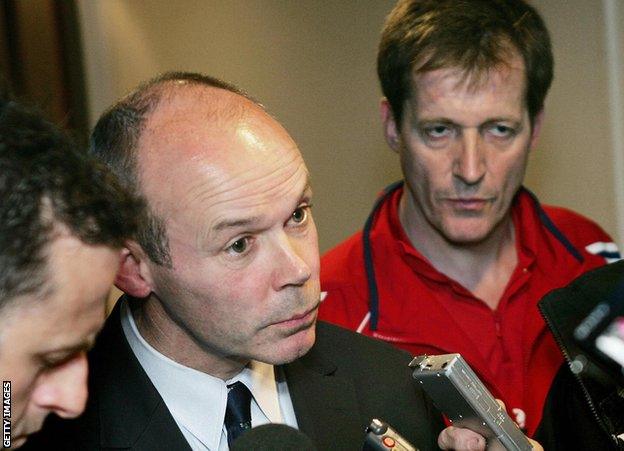
Alastair Campbell (right) gave an unpopular speech to the players, accusing them of not trying hard enough
"Clive became absolutely fixated. We had a meeting at a service station on the M1. A bloke working there spots us and asks if he can have a picture of the two of us. I said, 'Do you mind doing two separate photos?' So he did. And Clive said, 'That's why I need you, that's why I need you…'"
Campbell would later be described by then-All Blacks coach Graham Henry as "a person who doesn't know the game and doesn't have any passion for the game".
Campbell would also give a speech to the players on that tour accusing them of not trying hard enough - something which infuriated many, not least O'Connell, who admitted in his autobiography that he considered knocking Campbell out.
The players would have their revenge, both in newspapers afterwards and in controversial fashion on tour.
"We were coming out of a press conference," recalls Campbell, who was still helping Blair in advance of that summer's general election. "I think it was Steve Thompson and Paul O'Connell. Matt Dawson might have been involved.
"Anyway, they debagged me. It's a very juvenile thing these rugby players seem to like to do, but they pulled my trousers down. Schoolboy error, I hadn't done the laces up on my tracksuit bottoms, down they came.
"More importantly, my BlackBerry went flying out of my pocket. And it vanished. On that BlackBerry was a note, that said, 'To TB, cc GB - Transition.' Tony Blair, Gordon Brown. I was bricking it."
The split
Lions touring parties are not solely about the Test series. Matches against provincial sides both precede the Tests and come between them.
The most successful tours have seen less heralded names take the chance of impressing in the lower-profile matches to win selection for the Tests. Not in New Zealand.
"I was chairman of the midweek massive," says [ex-Wales outside centre] Tom Shanklin, about the obvious split that appeared in the squad.
"It was funny when they were reading out who was going to be on which bus. Bus one would be 'Wilkinson, O'Connell, O'Driscoll'. You're waiting for your name to be read out.
"Then bus two would be, 'Andy Titterell, Ollie Smith, Shanks…
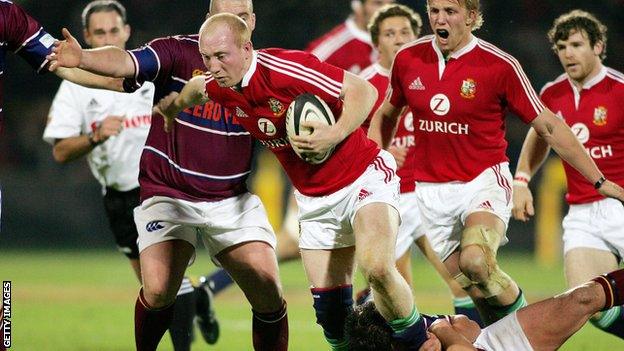
Tom Shanklin was one of several players who felt the side was divided
"There was that divide straight away. All the big dogs on bus one. You knew that you weren't in the selectors' thoughts."
Matt Dawson was on his third Lions tour, a series winner in South Africa eight years before, when he had come from the reserves to take a starring role, one of the narrow losers in Australia in 2001.
"You were split in terms of location too," he says. "Those bus one players would do rehab in the morning, while the others would go to the park to do tackling drills.
"In the first couple of weeks that sets the tone for the tour. I knew at best I would be on the bench. In a Lions capacity that simply doesn't work.
"There were two very distinct styles of playing between midweek and weekend. Looking back, that was where the coaches needed to grasp the nettle, to say as a Lions squad we are playing this way.
"It was very difficult to move from one squad to the next. Even if I know I'm not going to be playing, the coaches have a responsibility to make me feel like I still have a chance to play."
The anthem
There is no Lions anthem. When four discrete nations come together once every four years, none is needed.
Unless you are Sir Clive. Known for his maverick thinking, the coach decided to commission a new song, only three weeks before his team left.
He had never met the composer Neil Myers, apparently selecting him because he liked the music he had done for a Sky Sports trailer of the tour. When Myers came up with The Power of Four,, external in under a week, Woodward then sent bracelets printed with the title to all his players.
"It didn't go according to plan," says the self-deprecating Myers.
"It was one of my first big jobs to do, and the politics wasn't really made clear. The concept is a good idea; the way it was implemented maybe wasn't.
"The first time the players and fans heard it was a week before they flew out. I felt as if I needed more time. I'm not sure I would touch it again."
When the Power of Four was played before the first Test in Christchurch, not a single Lion sang along. Wales captain Alun Wyn Jones later quipped that he would rather have sung the Power of Love.
"Your work is a personal thing, and if it doesn't go down well then you do take it to heart," says Myers.
"You can't please everybody, but in this case I couldn't please anybody."
The injuries, and their aftermath
Twenty minutes into the opening tour match against Bay of Plenty, Dallaglio broke his ankle. His tour was over. In the first Test his World Cup-winning back-row partner Hill would also suffer a tour-ending injury.
In all, seven replacements had to be called up to fill the depleted ranks. But no injury was as critical - or controversial - as the dislocated shoulder suffered by captain O'Driscoll in the opening minute of that first Test, when he was upended by All Blacks centre Tana Umaga and hooker Keven Mealamu.
The loss of the tourists' talisman was one thing. The aftermath was quite another.
"The one thing I'll take away from that tour was how vicious the media were," says O'Driscoll's friend and fellow Ireland star Shane Horgan.
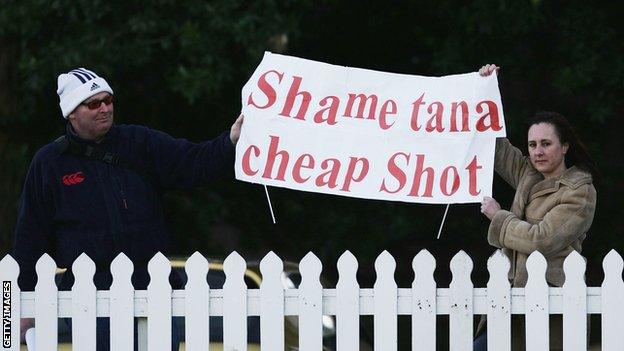
Fans let their feelings be known at New Zealand training sessions
"I'd never experienced anything like it in New Zealand; maybe that's because I'm Irish, and we generally get a great welcome wherever we go. But the New Zealand media was a fifth column for them. They were part of the All Blacks organisation.
"It was just amazing to me how that incident was changed from one where Brian was the victim of a horrific tackle, extremely dangerous, at the very least extreme recklessness from the two players who inflicted it upon him, that was then turned into somehow our people were whingers for bringing it up."
O'Sullivan revealed afterwards that O'Driscoll thought he was going to die, twisting just before impact to land on his shoulder rather than head.
"The lesson for me this time is to not care about trying to win the hearts and minds of the people over there," he added.
The loneliness
Lions players had always roomed together, seldom with men of the same nationality. It was about bonding as much as budget, forming fresh relationships as much as breaking old cliques.
Woodward saw it differently. He had given his England players their own rooms, reasoning that they deserved the space and peace. His Lions would be given the same luxury.
"You do need to invest in each other, invest in relationships," says O'Connell, who would go on to captain the Lions four years later.
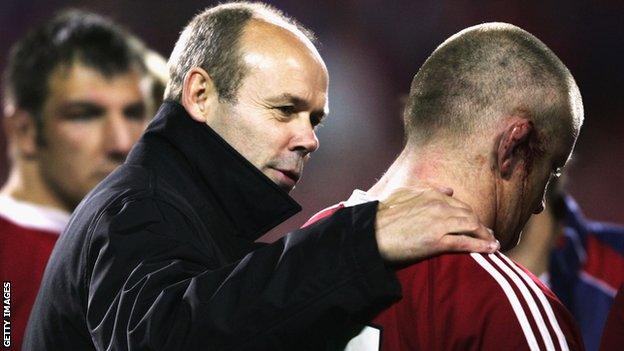
Woodward said his work with the Lions "was not the top" of his coaching career
"You need to spend a little time together socially, and that's one of the things we probably didn't get the chance to do.
"The best thing you can do for team morale in any team I've been involved in is win matches. When you're winning matches, team morale is great. When you're losing, it can be very tough.
"If you're in South Africa you go on safari together. You can be in Sydney playing a Lions Test, and a lot of the city and country won't be bothered about it. It's very hard to be that way in New Zealand.
"We roomed on our own, and it was a tough tour. In Wellington there was a really nice bookshop with good cakes, and I used to go there in the evenings on my own and read a book, have a cup of coffee, eat a few cakes.
"It was a very tough period in my career, and a bit of a lonely one too."
The ethos
Maybe nothing could have won that Test series for the Lions. New Zealand's Dan Carter was in his first flowering, Richie McCaw became the world's best open-side. In Umaga, Ali Williams, Conrad Smith and Jerry Collins the All Blacks had the outstanding players in their positions.
Maybe. Others would argue that the collective magic that defines the best Lions tour was absent, lost in the coach's desire to replicate what had worked so well for England, weakened by an atypical attitude to an institution that so many adore.
"The Lions, to me, was not the top of my playing career, was not the top of my coaching career," states Woodward.
"Playing for England was, coaching England to a World Cup was. That was what I was about. I liked the Lions, but I sometimes think the Celtic countries put too much emphasis on it, that it's the top of the tree, whereas I don't think it is.
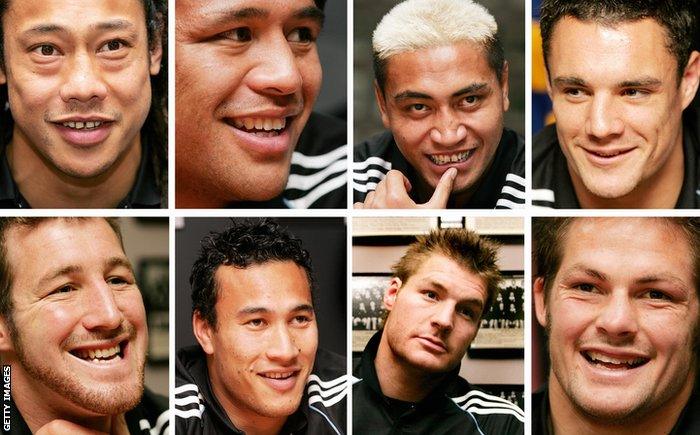
The New Zealand side was full of talented players - who performed to their very best
"It's a strange thing when you look at it logically - you play away from home, you've got a scratch team, and you've got to go to New Zealand. I've always said, if you're going to coach a Lions team, do it against Australia number one, then South Africa number two. New Zealand - the history there isn't good. There were a lot of people close to me telling me not to do it.
"I was saying, I've got to be totally focused on the Test matches. We've got to get rid of all this rubbish about touring, and all getting on, and being all happy happy. We've got to win. Because that is how you are remembered.
"I was very clear. When I presented this to the Lions committee, all these guys were nodding, because they wanted me to do the job."
The job did not come off. Among the more darkly comic memories is the chorus of Flower of Scotland late in the final Test of the 3-0 whitewash when hooker Gordon Bulloch came off the replacements' bench with 10 minutes to go, the first Scottish involvement of the entire series.
"I think I'm good at building teams," says Woodward, "but the Lions isn't about building teams. It's one moment in time, and you've got to do it in a different way.
"That's what I'm most annoyed about looking back - I should have been even more pragmatic about it. You can't be prepared. You haven't got the time to be prepared.
"The hurt was huge. Any sensible person wouldn't have done it. But the template was right. You needed to take that many players. You do need two different teams. I think the template should have been copied.
"Did we lose a Test match because the players didn't room together? No. Did we lose the first Test because we picked Jonny ahead of Henson? No. I don't regret taking Alastair Campbell. He was fantastic. That was one of my better decisions.
"Four years later they changed it back to sharing rooms, and midweek team, and all this wonderful Lions thing. They still got beat."
- Published19 April 2017
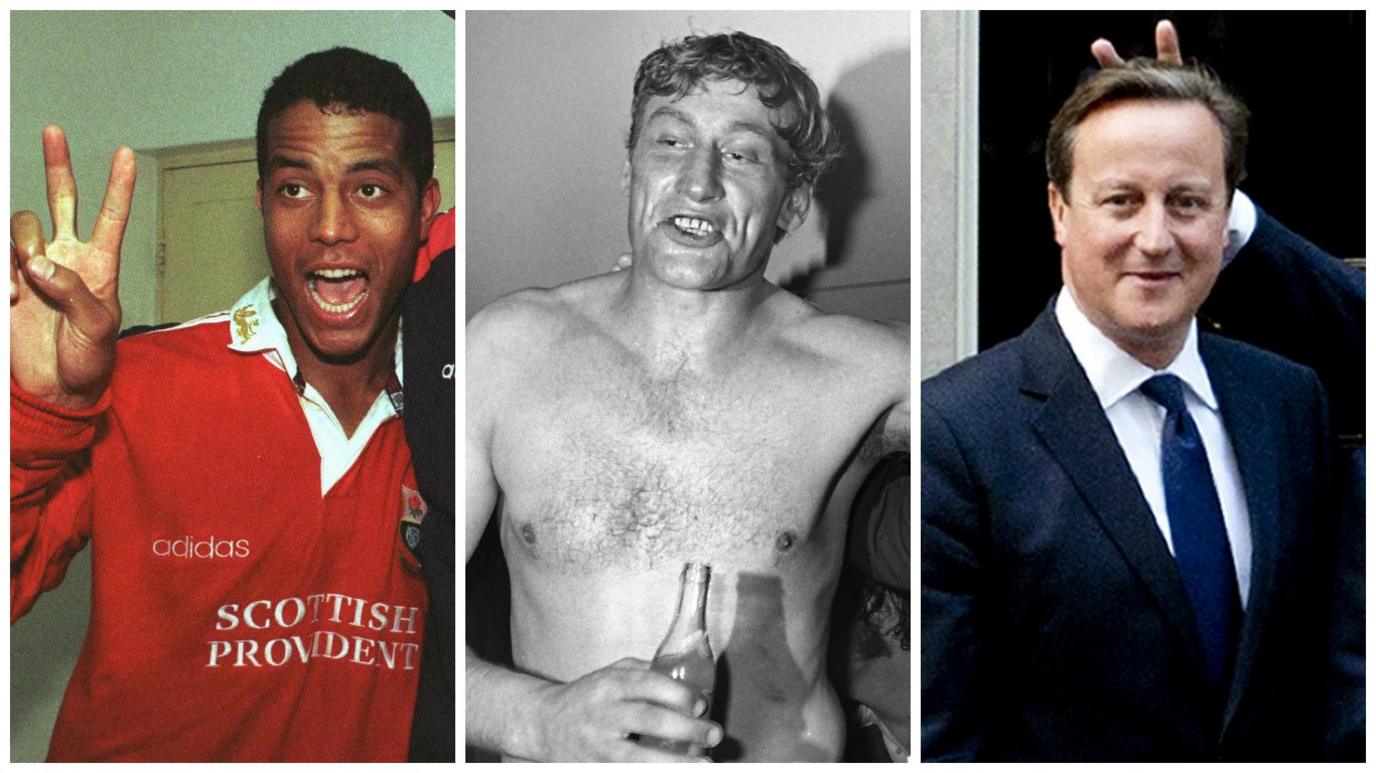
- Published13 June 2017
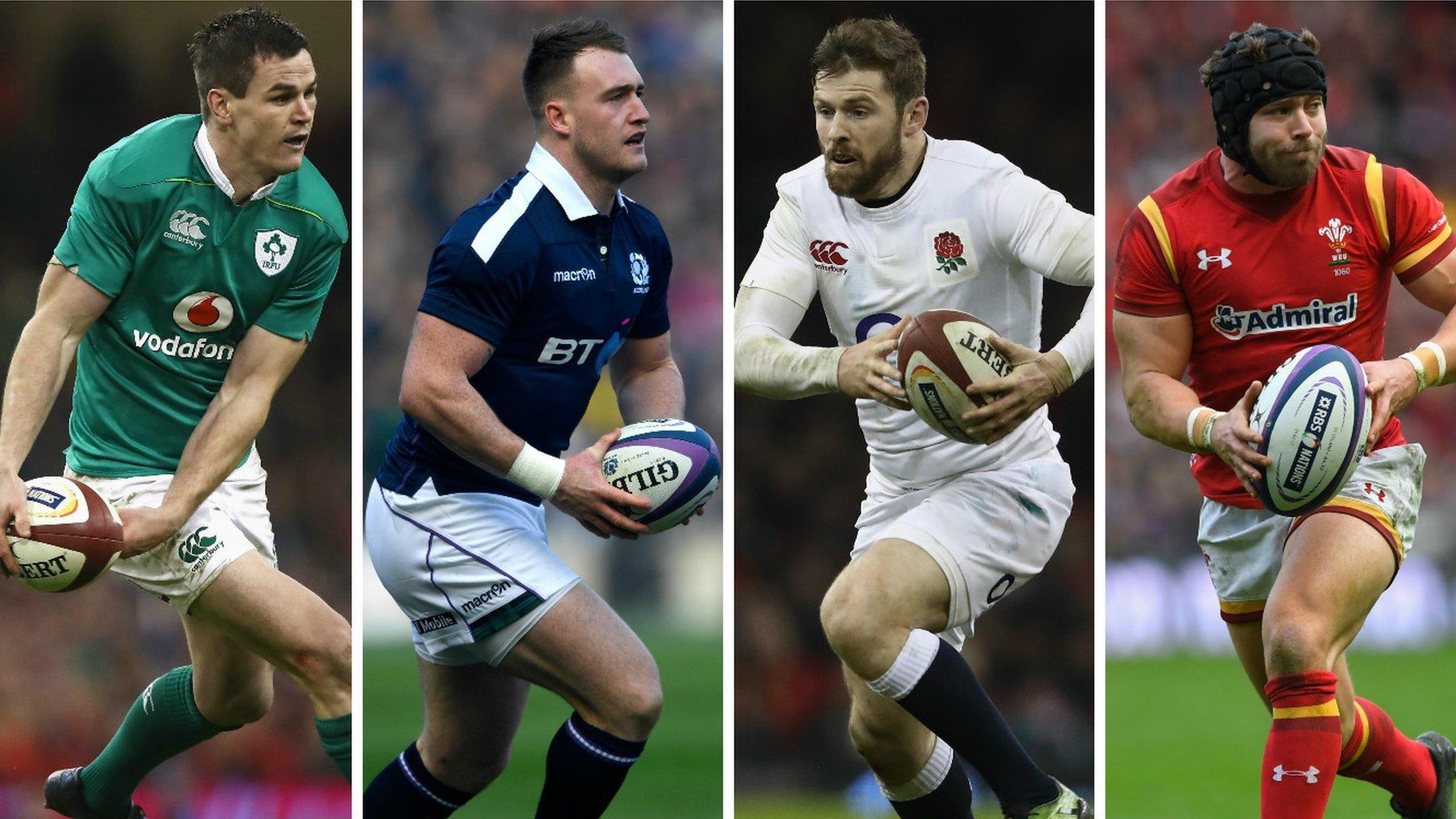
- Published25 May 2017
